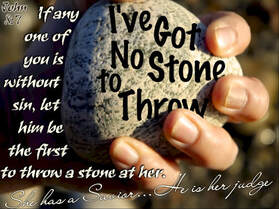
But early the next morning he was back again at the Temple. A crowd soon gathered, and he sat down and taught them. As he was speaking, the teachers of religious law and the Pharisees brought a woman who had been caught in the act of adultery. They put her in front of the crowd.
“Teacher,” they said to Jesus, “this woman was caught in the act of adultery. The law of Moses says to stone her. What do you say?”
They were trying to trap him into saying something they could use against him, but Jesus stooped down and wrote in the dust with his finger. They kept demanding an answer, so he stood up again and said, “All right, but let the one who has never sinned throw the first stone!” Then he stooped down again and wrote in the dust. When the accusers heard this, they slipped away one by one, beginning with the oldest, until only Jesus was left in the middle of the crowd with the woman. Then Jesus stood up again and said to the woman, “Where are your accusers? Didn’t even one of them condemn you?”
“No, Lord,” she said.
And Jesus said, “Neither do I. Go and sin no more.” John 8:2-11 NLT
How often do we look at another person’s sinful behavior and think to ourselves, I would never do that? Our municipal, state and federal laws have different levels of punishment, depending on the crime, yet our society is often quick to prosecute and anxious for punishment. The religious leaders and Pharisees were no different and, according to the laws of God as given to Moses, the punishment for adultery was death by stoning. We read in Leviticus 20:10 (NLT) “If a man commits adultery with another man’s wife, both the man and the woman must be put to death. They are guilty of a capital offense.”
In our first scripture above, the Pharisees were trying to trick Jesus. If He refused to let them stone the woman, He would be violating God’s law. If Jesus recommended, they execute her, they would turn Him over to the Romans because it was illegal, according to Roman law, for the Jews to perform their own executions. But Jesus would not fall into their trap. Instead of responding to their question, He bent down to write on the ground. We don’t know what Jesus wrote in the dust or if he was just ignoring the accusers.
Jesus’ ultimate response was to let them execute the woman caught in adultery, but He stated the one throwing the first stone had to be a person who had never sinned. As all of them had sinned, they gave up and walked away. Like the Pharisees, we too can be quick to judge. How many times have we figuratively “thrown stones” about another person’s sins, yet it is God’s role, not ours, to judge?
Jesus showed the woman forgiveness and compassion. He let her go away telling her she had not been condemned for her sins by Him or by others. While He did not condone her sin, He did tell her to sin no more. When we confess and repent of our sins, we are forgiven, but that does not give us a free pass to sin as much as we want. With God’s help we can accept Christ’s forgiveness and change our attitudes and behaviors.
Dear Heavenly Father, thank you for sending your Son, Jesus Christ, to save us from our sins. Please help us to stop judging and “throwing stones.” Instead, help us to be more like Jesus, showing forgiveness and compassion to others. Amen.

